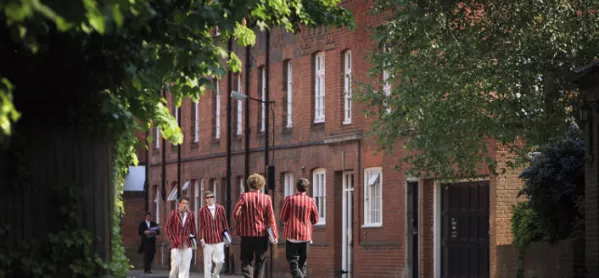Private school fees have risen by almost twice the rate of inflation over the past year to a record level, with London seeing the biggest increase, according to new research.
The overall figure, from today’s annual census of the Independent Schools Council (ISC), masks wide variations across the UK, with day fees for boarding schools in two areas actually falling.
The report published by the ISC, which represents more than 1,300 independent schools in the UK and overseas, says that the average fee increase in the UK this year was 3.7 per cent; currently inflation stands at 1.9 per cent.
Quick read: Big rise in UK private schools with overseas campuses
China: Big increase in the number of British schools predicted
Analysis: Will Brexit hurt UK private schools?
However, the ISC said that there “appears to have been a conscious effort by schools over the last 10 years to control fees”, with average fees rising by 3.9 per cent a year during the current decade, compared with 6.6 per cent between 2000 and 2010.
Private schools 'trying to limit fees'
London had the highest fees in the country, with the average boarding fee now £13,331 a term – taking the annual fee to just under £40,000.
The North East recorded the lowest termly boarding fee – £9,438.
The biggest increase in day fees at boarding schools was in Yorkshire and Humber, where the average rose by 11.9 per cent to £6,255.
In contrast, the day fee for boarding schools in the North West fell by 1.9 per cent to £5,042, while the average in the East Midlands fell by 0.1 per cent to £6,114.
Other key facts from today’s ISC report:
More pupils from Europe
ISC schools currently have 26,370 non-British pupils whose parents live in the UK. Of these, an increasing proportion come from the European Economic Area – 45 per cent, up 3 percentage points on the year before. The report says: “This is an interesting finding in light of Brexit."
Increase in bursaries
At a time of increasing pressure on independent schools to do more to improve social mobility, the amount of money ISC schools spent on means-tested bursaries rose 6.3 per cent to £133.5 million.
More partnerships with state schools
The census found a significant rise in links between private schools and those in the state sector. The number of partnerships recorded this year stood at 11,466, compared with 10,553 last year.
Fewer full-time boarders
A total of 72,912 pupils boarded at some point during spring term 2019. Full boarding remains the most popular type of boarding, but the proportion of boarders who do so on a weekly or flexi basis has risen in each of the past three years, from 15.7 per cent in 2016 to 17.9 per cent this year.
Five regions see private school populations fall
The overall number of pupils in ISC schools rose slightly in 2019 to 528,323 – up 0.1 per cent on the previous year – but the figure in Yorkshire and Humber dropped by 1.1 per cent, to 25,729. There were smaller falls in the South East, West Midlands, North West and East Midlands. Wales recorded the biggest increase, up 2.4 per cent to 7,407.





